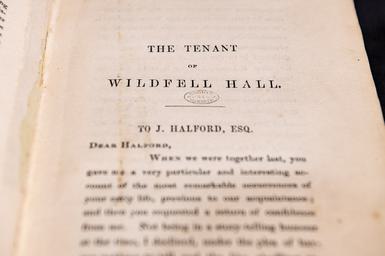
The Brontë novels
What did the Brontës write?
The Brontë sisters left a legacy through their much-loved, world-famous novels.
To this day, the works of these three sisters grip the imaginations of readers, inspiring artwork, music, TV, film and theatre globally.

Why have they had such an impact?
Between them, Charlotte, Emily, and Anne Brontë wrote seven books, including 'Jane Eyre', 'Wuthering Heights', and 'The Tenant of Wildfell Hall' respectively. They penned their novels here in the Parsonage - now the Brontë Parsonage Museum.
At the time, the sisters' writings were noted for their directness and emotional power - 19th-century critics called them 'coarse' and 'brutal'. Gripping plots, enduring characters, and passionate prose ensured the Brontës' novels would stand the test of time.
Find out more about each novel below.
By Charlotte Brontë
'Jane Eyre'
Charlotte Brontë's best-known work tells the story of Jane Eyre - a spirited, practical young woman who discovers a secret in the home of her employer, Mr Rochester.
Moral dilemmas, supernatural scenes, and evocative landscapes characterise the first novel Charlotte had published.
'Shirley'
Charlotte’s second published novel was a perceptive exploration of the industrialising Yorkshire she observed around her.
Though set in the Luddite era, many of her characters were inspired by people she knew in her own time, including her sister Emily and best friend Mary Taylor. It provides a powerful analysis of women’s experience in a changing Britain.
'Villette'
In Charlotte Brontë’s last novel published in her lifetime, follow Lucy Snowe as she navigates her new life in Villette, largely inspired by Charlotte’s own time in Brussels
Expect autobiographical anecdotes, descriptive scenes, and the hints at the supernatural for which the author is famous.
'The Professor'
'The Professor' was Charlotte Brontë's first novel, but wasn't published until 1857, after Charlotte's death. The story centres around William Crimsworth, following his unplanned departure from Yorkshire over the Channel to Belgium...
Many have suggested that Charlotte drew from her own experience teaching in Brussels when writing the novel.
By Emily Brontë
'Wuthering Heights'
'Wuthering Heights' shocked audiences when first published. But its morally ambiguous tone, which caused such offence to 19th-century critics, is perhaps what continues to entice readers today.
Emily Brontë's passionate tale of two families evokes the turbulent Yorkshire moorland around Haworth. Its nightmarish, Gothic elements and infamous protagonists, Cathy and Heathcliff, have helped it remain a genre-defining classic.
By Anne Brontë
'Agnes Grey'
Anne's first novel reveals the truth of what it was like working as a governess in Victorian England.
Influenced by her own experiences, Anne tells the story of Agnes - the youngest daughter of a clergyman, who sets off to prove she can make a life for herself. By exposing the reality of work for the 19th-century middle-class woman, 'Agnes Grey' is Anne’s first endeavour at championing women’s rights.
'The Tenant of Wildfell Hall'
In 'The Tenant of Wildfell Hall', Anne Brontë lays bare the realities of drunkenness and abuse, recounting her heroine's attempts to escape from a corrupt husband.
Set firmly against the protagonist's moralising tone, 'The Tenant of Wildfell Hall' bravely addresses a dark underside to the privileged society of the time, exploring women's agency within it.
Dive into the worlds of the Brontë novels.
Our museum bookshop is your starting point for beautiful editions, secondary literature, and new fiction inspired by the Brontës.






